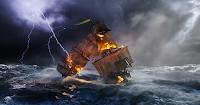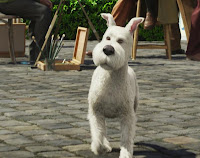When a director makes a movie, one of the most important things to keep in mind is the target audience. Sometimes, a director has to make a children's film that faces severe scrutiny from adults. Very rarely does such a film match the expectations of this adult audience since typically their expectation is based on a childhood love of comic books (or normal books). Steven Spielberg's The Adventures of Tintin: The Secret of the Unicorn is a notable exception in this respect. Not only does the movie do an excellent job of keeping the viewers on the edge of their seats throughout the 107 minutes of its running time, but it also pays due attention to the smallest of details that were so important in Hergé's original comics.
 The movie starts with a Catch Me If You Can-style animated silhouette opening credit sequence that uses the same font as in the Tintin comic book titles. This sequence itself is full of references to other Tintin stories. Then when the opening shot was an animated Hergé painting a street portrait of Tintin, I had a feeling that the movie was going to be respectful to the original creation. I wasn't wrong.
The movie starts with a Catch Me If You Can-style animated silhouette opening credit sequence that uses the same font as in the Tintin comic book titles. This sequence itself is full of references to other Tintin stories. Then when the opening shot was an animated Hergé painting a street portrait of Tintin, I had a feeling that the movie was going to be respectful to the original creation. I wasn't wrong.
The movie combines story elements from three comic books: The Crab with the Golden Claws, The Secret of the Unicorn and Red Rackham's Treasure. Tintin meets Captain Haddock in this movie. The Thompsons and Nestor are in the movie as well. Important comic book characters Omar Ben Salaad and Bianca Castafiore make brief appearances too. We see references to The Cigars of the Pharaoh, The Broken Ear and King Ottokar's Sceptre, among others. As for Professor Calculus, he does not appear in this movie. He will probably be introduced in the sequel.
 In a motion capture movie it hardly makes any sense to talk about the cast since anybody can be made to look like any character, but the cast here looks good. The Captain Haddock of the film is more the Haddock of The Crab with the Golden Claws and less the Haddock of the latter stories which I think is understandable. The camera work is amazing, although it is all done with a virtual camera. The detail in the graphics is breathtaking. The music is good, though I have heard much better from John Williams.
In a motion capture movie it hardly makes any sense to talk about the cast since anybody can be made to look like any character, but the cast here looks good. The Captain Haddock of the film is more the Haddock of The Crab with the Golden Claws and less the Haddock of the latter stories which I think is understandable. The camera work is amazing, although it is all done with a virtual camera. The detail in the graphics is breathtaking. The music is good, though I have heard much better from John Williams. And then there is Snowy. No review of this movie can be complete without a special mention of the CGI Snowy. As in the comics, in every scene Snowy is doing something or the other on the side even when the main characters are engaged in something else, and the time the artists have spent in drawing the actions and reactions of this realistic little dog is really praiseworthy. In one particular scene Snowy comes face-to-face with a sitting camel, and the silent little interaction between the two animals keeps coming back to the mind.
And then there is Snowy. No review of this movie can be complete without a special mention of the CGI Snowy. As in the comics, in every scene Snowy is doing something or the other on the side even when the main characters are engaged in something else, and the time the artists have spent in drawing the actions and reactions of this realistic little dog is really praiseworthy. In one particular scene Snowy comes face-to-face with a sitting camel, and the silent little interaction between the two animals keeps coming back to the mind. Some of my friends expressed displeasure at the amount of Batman-like action packed into the movie but I disagree. The Tintin fans know all about the story, and yet, these very fans want to remain entertained throughout. These fans, like me, have grown up reading Tintin comic books and now, as adults, want to be entertained by a movie that retains the simplicity of the comic books and combines it with the superb film making techniques we normally associate with Spielberg. Almost two decades ago he gave us Jurassic Park, and to this day I cannot find a single flaw in the computer generated dinosaurs. The quality of the animation in Tintin is so good that a few times during the movie I felt some character's movement looked unnatural, only to remember that it was not a live action movie.
Some of my friends expressed displeasure at the amount of Batman-like action packed into the movie but I disagree. The Tintin fans know all about the story, and yet, these very fans want to remain entertained throughout. These fans, like me, have grown up reading Tintin comic books and now, as adults, want to be entertained by a movie that retains the simplicity of the comic books and combines it with the superb film making techniques we normally associate with Spielberg. Almost two decades ago he gave us Jurassic Park, and to this day I cannot find a single flaw in the computer generated dinosaurs. The quality of the animation in Tintin is so good that a few times during the movie I felt some character's movement looked unnatural, only to remember that it was not a live action movie.
I had been waiting for a long time to see this film. Tintin released in India on 11.11.11 when I was in the US. It released in the US on December 21st - the day I left for India. Back in Kolkata, only one theatre is still showing the movie in one show. I had to travel for two and a half hours to get there and could buy the ticket for the 11:45am show only at 11:45am. I ended up seeing the movie from the front row. But for the two hours the movie was running, I forgot all about everything outside the Tintin universe. In the end, every second of it was worth the wait and the trouble.

































